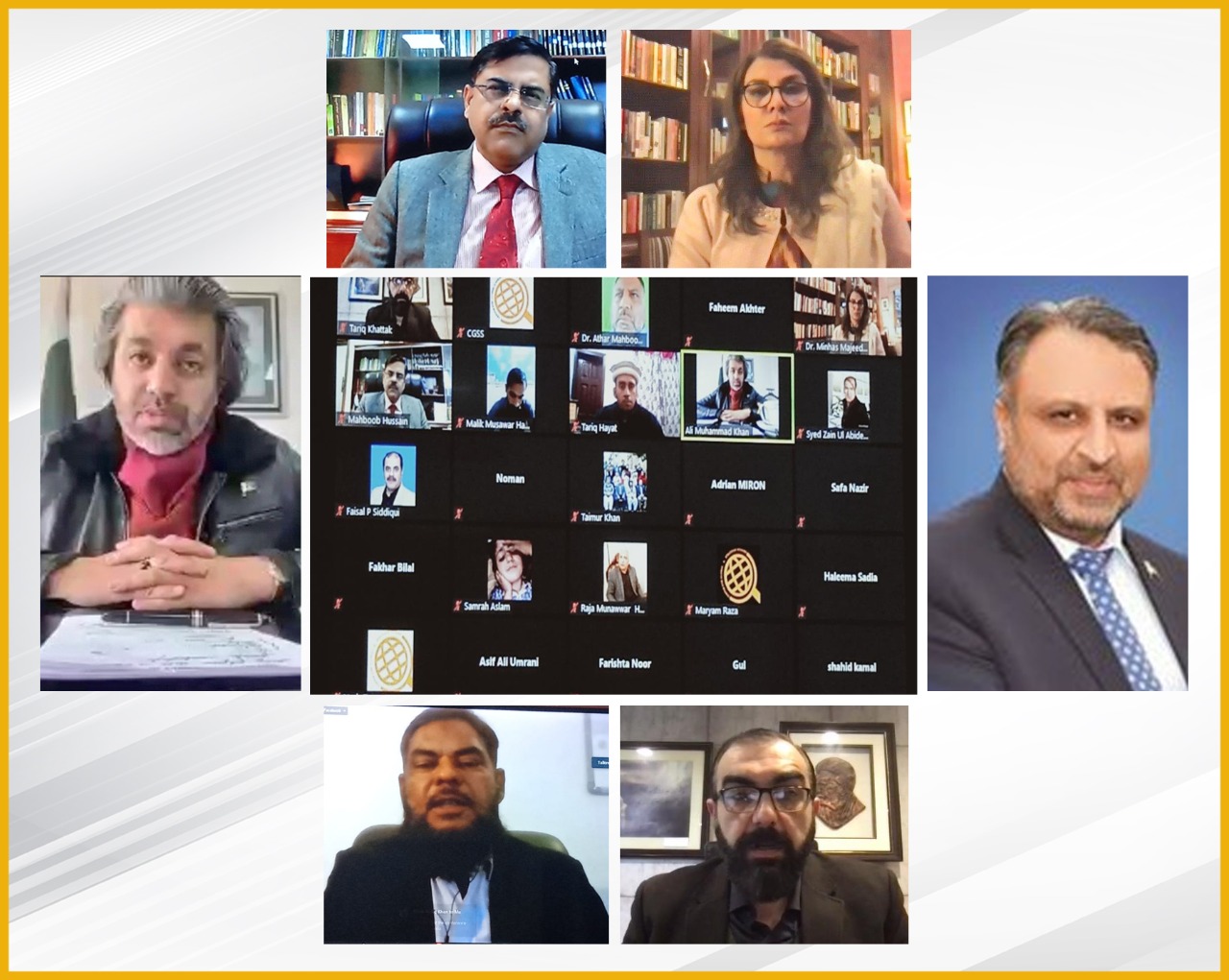Online Conference on "Countering Islamophobia: Deconstructing Misconceptions" organized by Center for Global & Strategic Studies (CGSS), Islamabad

On 27th January 2021 Center for Global & Strategic Studies (CGSS), Islamabad organized an Online Conference on, "Countering Islamophobia: Deconstructing Misconceptions."
The conference aimed to understand the rising dilemma of Islamophobia, examine the world’s perspective, and establish a unified response by Muslim nations to tackle the anti-Muslim sentiments.
The conference commenced with the speech of His Excellency Ali Muhammad Khan, Minister of State for Parliamentary Affairs, Government of Pakistan, he discussed Policy Options for Pakistan to Counter Rising Islamophobia. He stated that it is a very diverse topic and many of its aspects must be covered. To begin with, he mentioned that our Holy Prophet (PBUH) was sent as a blessing not only for Muslims but for the entire humanity, it is something to ponder that why our religion of peace is now seen as a religion of hatred?
The misconceptions spread in the world is because globally there is no practical display of the teachings of Islam. It is important to practically manifesting the true spirit of Islam. He also emphasized that the main role of Muslims is to engage with western countries and people with constructive dialogues. He also highlighted the role of educated youth and its role in spreading awareness about our religion and its values.
Engr. Prof. Dr. Athar Mahboob, Vice-Chancellor, Islamia University of Bahawalpur (IUB), Bahawalpur, highlighted the Systematic Genocide of Muslims around the world and Moral Imperatives. He stated that for Muslims the unchallengeable word is of the Quran, it is important to follow its teachings to be true Muslims. Muslims should realize and spread that Islam is a religion of accommodation, from the very start our religion teaches us to respect other religions and their places of worship it also protects the rights of non-Muslims. He concluded by emphasizing that Islamophobia has always existed in the west and there needs to be a collective approach to handle it effectively.
Dr. Mahboob Hussain, Chairman, Department of History and Pakistan Studies, University of Punjab, Lahore shared his thoughts on the Historical Perspective of Islamophobia: Roots and Causes. He explained the concept and meaning of Islamophobia in detail and stated that Islamophobia can be defined as an irrational fear of Islam. Its first use is said to be in the 1980s. He highlighted that Islam became a victim of racial prejudice due to its worldwide expansion in a very short period, it challenged the west culturally and politically. He also highlighted the origin of Islamophobia. He also presented an overview of the research that how the Australian public is being bombarded by anti-Islamic news by its media under negative connotations.
Dr. Minhas Majeed Marwat, Department of International Relations, University of Peshawar, Peshawar discussed the Role of Muslim Countries and Institutions, Specifically OIC, in Effectively Tackling Islamophobia. She highlighted the role of the Organization of Islamic Council and various steps taken by it. The OIC has been successful in many areas but it has come short vis-à-vis certain challenges. Right from when it was initiated in 1969, OIC has worked for harmony and stability of the world. Moreover, it has passed various resolutions to take issues of Islamophobia to the institutional level. It also formed an Islamophobia observatory to observe the magnitude of Islamophobia from around the world. It also took the initiative to start a technical body to keep a strict check on blasphemous content worldwide.
Dr. Faheem Akhter, Head of Department Management Science and Humanities & Social Sciences, DHA Suffa University, Karachi discussed, Unpacking Structural Islamophobia: What happens when stereotypes and prejudice go unchecked?
Dr. Faheem rightfully pointed out that Islam is a religion of peace, it is the fastest-growing religion in the world and particularly in the west. He also highlighted that after the event of 9/11 more and more people started to research and study Islam. Dr. Faheem presented some statistics and stated that a study shows that by 2030 the Muslim population will increase by 35% across the globe.
He also mentioned that the west is not particularly afraid of Islam but it is afraid of Muslims. This is the area of concern that we must work on. Muslims have a collective responsibility to remove the tag of terrorists from themselves and spread the true teachings of our religion. He stated that we should get guidance from Holy Quran rather than taking guidance from those who are taking us away from it.
The conference was moderated by Mr. Tariq Khattak, Member Board of Experts, CGSS, and was attended by 70 people from various sectors. It was also viewed live on social media platforms by more than 300 viewers.









.jpeg)